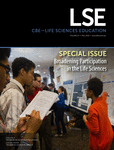Factors Influencing Student Gains from Undergraduate Research Experiences at a Hispanic-Serving Institution
Abstract
Undergraduate research experiences (UREs) confer many benefits to students, including improved self-confidence, better communication skills, and an increased likelihood of pursuing science careers. Additionally, UREs may be particularly important for racial/ethnic minority students who are underrepresented in the science workforce. We examined factors hypothetically relevant to underrepresented minority student gains from UREs at a Hispanic-serving institution, such as mentoring quality, family income, being Latino/a, and caring for dependents. Data came from a 2013 survey of University of Texas at El Paso students engaged in 10 URE programs (n = 227). Using generalized linear models (GzLMs) and adjusting for known covariates, we found that students who reported receiving higher-quality mentorship, spending more hours caring for dependents, and receiving more programmatic resources experienced significantly greater gains from their URE in all three areas we examined (i.e., thinking and working like a scientist, personal gains, and gains in skills). In two of three areas, duration of the URE was positive and significant. Being Latino/a was positive and significant only in the model predicting personal gains. Across the three models, quality of mentorship was the most important correlate of gains. This suggests that providing training to faculty mentors involved in UREs may improve student outcomes and increase program efficacy.



